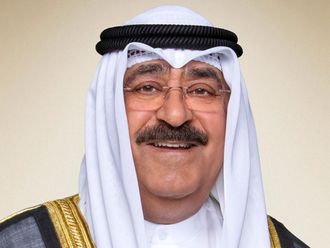Manama: Kuwait's new interior minister has pledged a zero-tolerance policy towards people who challenge the law.
"There is the legal text between the ministry and those who break the law," Shaikh Ahmad Al Humood said. "The ministry is in charge of security and we will apply the law without discerning between people. I urge those who for instance insist on holding rallies or conferences to read the text carefully and to help me with the application of the law," Shaikh Ahmad told Kuwaiti daily Al Dar.
A political turmoil hit Kuwait in December and January when security forces sought to break a rally held ostensibly to discuss constitutional amendments amid calls by the opposition to force the prime minister to resign. Several people were reportedly injured in the clashes between anti-riot police and protesters. The police said that they were taunted by the protesters, while some MPs and intellectuals said that they were charged by the security forces even though they did not break the law.
Under the regulations, people are allowed to gather inside diwaniyas, the traditional private halls often attached to houses, but cannot hold their rallies in the open.
The issue escalated at the social and political levels and the prime minister was eventually grilled by the opposition. He, however, survived the no-cooperation vote although the interior minister left the government this week after he resigned over the death under torture of a Kuwaiti citizen.
Shaikh Ahmad, who was given the interior portfolio in 1991, was appointed to replace him. The fallout of the Kuwaiti's death in the custody of the police, including a far-reaching internal investigation, and the insistence of the opposition to use street pressure to out the prime minister are among the top issues on his agenda.
"I am familiar with the interior ministry and I have a clear vision of how it operates. I will consult with officials before I make decisions and movements and transfers of the ministry personnel will depend on the convictions and views I will develop after I gain more insights into what has been happening. Decisions are not made overnight, but when they are made, they have to be implemented," he said in the interview published on Wednesday.
According to the daily, the minister will rely on fresh blood and young people in his work.












